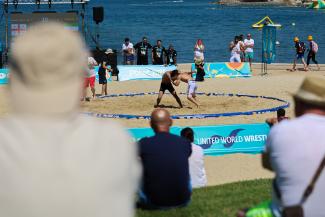Japan secures 2 Olympic spots; Elor returns to World Championships final
Wednesday, September 20, 2023 - 23:48 By Vinay Siwach

BELGRADE, Serbia (September 20) -- The World Championships in Belgrade has seen a number of champions fall to young stars but the biggest of all could have come on Wednesday as Lucia YEPEZ (ECU) scored five points on Akari FUJINAMI (JPN), who entered the tournament with a 122-match winning streak which goes back to her junior high school days.
In the 53kg quarterfinal, Yepez scored raced to a 5-0 lead against Fujinami, who admitted that she felt anxious after giving up the lead, but composed herself and pinned the Ecuadorian.
Fujinami recovered from that shock match and defeated Maria PREVALORAKI (GRE) to secure a spot for Japan for the Paris Olympics next year. According to Japan Wrestling Federation rules, a wrestler who qualifies the weight for Paris with a medal in Belgrade automatically secures a spot on the Japan team as well.
"In the match against Ecuador, it's something that's never happened up to now," Fujinami said. "It ended up being a good match. Right now, I don't know, it really hasn't sunk in."
Yepez opened the bout with a double leg for two then hit a single leg which Fujinami defended before Yepez grabbed her around the waist and threw the Japanese, earning two more points. A stepout made it 5-0. Fujinami then got back to doing what she does best and locked up a lace to lead 14-5.
She gave up two more points but Fujinami locked the arm and got the fall with 1:10 remaining on the clock. The 2021 world champion explained that she will try to win her second world gold medal on Thursday.
"I came for the Olympic berth and to become the world champion and I want it to carry over to tomorrow," she said. "In the third-round match, I got a little anxious at one point, but I just thought, it's OK, just do what I always do. It was a tough match, but I was able to pull out the win."
Sakura MOTOKI (JPN) will join Fujinami on that trip to Paris as she entered the final at 62kg, securing her spot on the Japan team.
However, Ami ISHII (JPN), returning silver medalist, will have to slog it out in the bronze medal bouts to secure her spot after she was stunned by Buse TOSUN (TUR) 11-1 in the 68kg semifinals.
Fujinami will now face Tokyo Olympic bronze medalist Vanesa KALADZINSKAYA (AIN) for the gold medal after the Individual Neutral Athlete snatched a victory from U20 world champion ANTIM (UWW) in the final second of the semifinal.
Antim scored a takedown with an ankle pick and led 4-3 with three seconds remaining and got her grip loose. The willy Kaladzinskaya locked Antim's elbow and scored an exposure with 0.3 seconds on the clock for a remarkable 5-3 win.
Motoki had to dig deep to beat world silver medalist at 59kg Grace BULLEN (NOR) as she etched out a 2-1 win. Motoki will now face Olympic silver medalist Aisuluu TYNYBEKOVA (KGZ).
Motoki will look to join the list of Japanese wrestlers who have denied Tynybekova a world or Olympic gold medal in the last two years. The Kyrgyz wrestler lost to Yukako KAWAI (JPN) in the Tokyo Olympics final and then to teenage star Nonoka OZAKI (JPN) in the World Championships last year.
Tynybekova has bounced back, beating Ozaki in the Asian Championships and will have her hands full as she takes on Motoki for her third world gold medal.
Kyrgyzstan's first world champion, Tynybekova defeated Tokyo bronze medalist Iryna KOLIADENKO (UKR), 2-2, in the quarterfinal, a completely contrasting win than her 10-0 win in Tokyo over the Ukrainian. Tynybekova then defeated Luisa NIEMESCH (GER) 4-2 in the semifinal.
At 68kg, Tosun did not let Ishii settle down after giving up a stepout, using a headlock when Ishii was going for an underhook for four points. Tosun tried pinning Ishii but the Japanese survived and as she was trying to escape, Tosun put her on the back for two more points to lead 6-1 with four minutes left. And as Ishii tried calming herself, Tosun scored another takedown on the edge.
Ishii tried an underhook again and Tosun hit another headlock, this time getting only two points. But that made the score 10-1 and Tosun managed to push Ishii out to win 11-1 with 3:19 left on the clock.
Delgermaa ENKHSAIKHAN (MGL) reached the final from the other side of the bracket as she pinned Emma BRUNTIL (USA) in the other semifinal. She defeated Koumba LARROQUE (FRA) 2-1 in the quarterfinals.
In the non-Olympic weight class 72kg, defending world champion Amit ELOR (USA) entered the final with another dominant display, winning her semifinal against Kendra DACHER (FRA) 12-2. Elor took out 65kg world champion Miwa MORIKAWA (JPN) in the quarterfinals.
Chasing her second straight title, Elor will take on Davaanasan ENKH AMAR (MGL) in the final after the Mongolian defeated two-time returning world silver medalist Zhamila BAKBERGENOVA (KAZ) 6-2.


Share your thoughts.
Comments